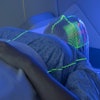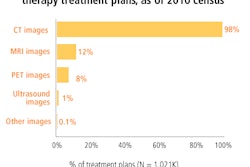SAN DIEGO - Breast cancer patients who need radiation therapy (RT) following a mastectomy can have reconstructive surgery immediately without concern that their breast implants will compromise the radiation they receive, according to a presentation at this week's American Society for Radiation Oncology (ASTRO) conference.
That's according to a research team from Memorial Sloan-Kettering Cancer Center in New York City. But findings from another study from the same institution revealed that almost one-fourth of women who undergo immediate permanent breast reconstruction and postmastectomy radiation will have their implants permanently removed or replaced in the ensuing five years.
The good news
In the first study, radiation oncologists and medical physicists at Memorial Sloan-Kettering decided to conduct a retrospective analysis of five years of data to determine whether bilateral breast implants affected the radiation therapy treatments of their patients. Their objective was to determine if the presence of bilateral implants affected coverage of the target volume and radiation dose delivered to the heart and lung, according to radiation oncology resident Nisha Patel, MD.
Between 2004 and 2009, 197 patients with locally advanced breast cancer underwent a mastectomy and breast reconstruction surgery with immediate tissue expander placement (19%) or permanent implant placement (81%). Approximately half of the patients had bilateral implants.
All patients received a radiation dose of 50 Gy. Radiation Therapy Oncology Group (RTOG) Breast Cancer Contouring Atlas guidelines were used to contour the chest wall. Ninety percent of the patients had a clinical target volume dose of 95% to 98%. The presence of bilateral implants did not compromise coverage of the target volume or increase the radiation dose to the heart and lungs.
The research team also determined that irradiation of permanent implants was effectively comparable to the irradiation of tissue expanders: Neither resulted in inferior dosimetric outcomes. However, patients who required radiation of internal mammary nodes received higher radiation doses to the heart and lung than patients who did not need internal mammary node radiation.
The not-so-good news
The timing of breast reconstructive surgery for breast cancer patients who need radiation therapy following a mastectomy has been a much-debated subject for oncologists, breast surgeons, and radiation oncologists. Some peer-review studies suggest that breast reconstruction can be negatively affected by radiation, with suboptimal results.
Alice Ho, MD, a radiation oncologist specializing in breast cancer, led a team that conducted a retrospective study of 10 years of data to determine the incidence of permanent breast implant removal and replacement. They also wanted to identify factors associated implant removal, as well as clinical outcomes.
An advantage for Memorial Sloan-Kettering is that it uses a uniform protocol for both reconstructive surgery and radiation therapy. The research team identified 151 patients with stage II (31%) and stage III (69%) cancer who had mastectomies, underwent chemotherapy with a tissue expander, had the tissue expander replaced with a permanent implant, and then had their radiation treatments to the chest wall and regional lymph nodes. More than 80% subsequently started hormonal therapy. The median time between the mastectomy and start of radiation therapy was eight months, Ho reported.
Over the next five years, 21 implants were replaced and 17 were permanently removed; 18 patients experienced capsular contracture. Fifteen cases of infection were identified, as were four cases of implant extrusion, shift, leak, or rupture. One patient requested a removal; the reason for this was not identified. No specific factors could be attributed to these problems, according to Ho, although trends could be identified in patients with multifocal tumors and positive lymph nodes.
Overall, complications occurred in 23% of the patients, which the research team considers to be a favorable outcome. Perhaps even more favorable was that only two patients (1.3%) experienced local recurrence. Seven years after follow-up, the overall survival rate of these advanced breast cancer patients was 93% and distant-metastasis-free survival was 81%.
By Cynthia E. Keen
AuntMinnie.com staff writer
November 3, 2010
Related Reading
Immediate postmastectomy reconstruction tied to better breast cancer survival, November 11, 2009
Experts debate merits of breast reconstruction before radiation therapy, February 2, 2009
Optimizing the method, moment for reconstructing the irradiated breast, October 26, 2006
Complications common with postmastectomy breast reconstruction, December 20, 2005
Radiation therapy may affect implants used in breast surgery, August 22, 2000
Copyright © 2010 AuntMinnie.com



















